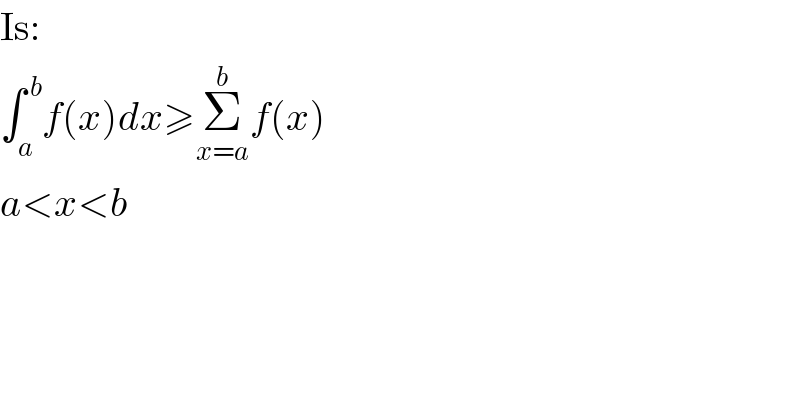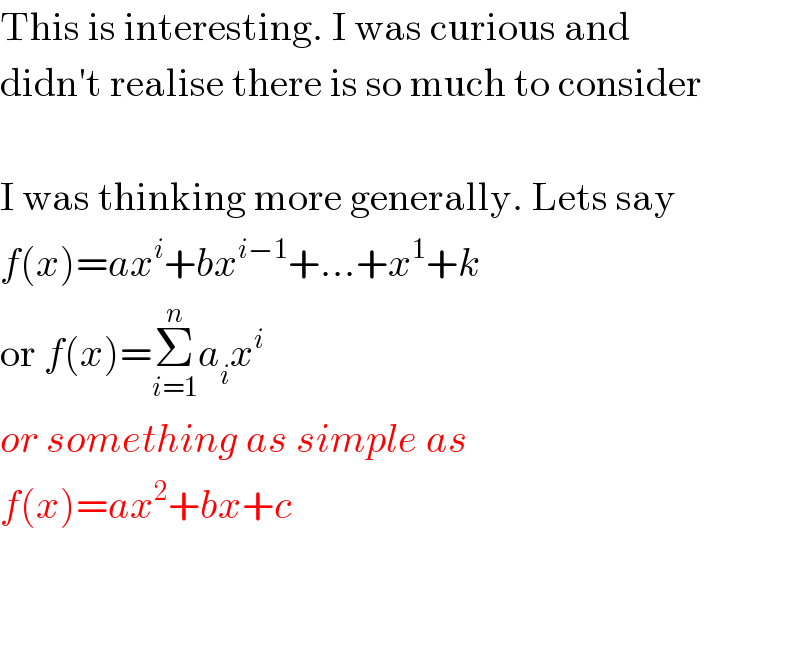
Question Number 2776 by Filup last updated on 27/Nov/15

$$\mathrm{Is}: \\ $$ $$\int_{{a}} ^{\:{b}} {f}\left({x}\right){dx}\geqslant\underset{{x}={a}} {\overset{{b}} {\sum}}{f}\left({x}\right) \\ $$ $${a}<{x}<{b} \\ $$
Commented byFilup last updated on 27/Nov/15

$$\mathrm{That}\:\mathrm{is}\:\mathrm{what}\:\mathrm{I}\:\mathrm{would}\:\mathrm{assume} \\ $$
Commented byFilup last updated on 27/Nov/15

$$\mathrm{This}\:\mathrm{is}\:\mathrm{interesting}.\:\mathrm{I}\:\mathrm{was}\:\mathrm{curious}\:\mathrm{and} \\ $$ $$\mathrm{didn}'\mathrm{t}\:\mathrm{realise}\:\mathrm{there}\:\mathrm{is}\:\mathrm{so}\:\mathrm{much}\:\mathrm{to}\:\mathrm{consider} \\ $$ $$ \\ $$ $$\mathrm{I}\:\mathrm{was}\:\mathrm{thinking}\:\mathrm{more}\:\mathrm{generally}.\:\mathrm{Lets}\:\mathrm{say} \\ $$ $${f}\left({x}\right)={ax}^{{i}} +{bx}^{{i}−\mathrm{1}} +...+{x}^{\mathrm{1}} +{k} \\ $$ $$\mathrm{or}\:{f}\left({x}\right)=\underset{{i}=\mathrm{1}} {\overset{{n}} {\sum}}{a}_{{i}} {x}^{{i}} \\ $$ $${or}\:{something}\:{as}\:{simple}\:{as} \\ $$ $${f}\left({x}\right)={ax}^{\mathrm{2}} +{bx}+{c} \\ $$ $$ \\ $$ $$ \\ $$
Commented byYozzi last updated on 27/Nov/15

$${What}\:{does}\:\underset{{x}={a}} {\overset{{b}} {\sum}}{f}\left({x}\right)\:{mean}?\:{Is}\:{it}\:{implying} \\ $$ $${that}\:{a},{b}\in\mathbb{Z}?\:{If}\:{you}'{re}\:{trying}\:{to}\:{say} \\ $$ $${to}\:{add}\:{up}\:{all}\:{values}\:{of}\:{f}\left({x}\right)\:{for} \\ $$ $${f}\left({x}\right)\:{being}\:{continuous}\:{and}\:{positive}\:{in}\:{the} \\ $$ $${interval}\:{a}<{x}<{b},\:\underset{{x}={a}} {\overset{{b}} {\sum}}{f}\left({x}\right)\:{is}\:{divergent} \\ $$ $${since}\:{the}\:{set}\:{X}=\left\{{x}\in\mathbb{R}\mid{a}<{x}<{b}\right\} \\ $$ $${has}\:{non}−{finite}\:{cardinality}.\: \\ $$ $${If}\:{f}\left({x}\right)\:{is}\:{continous}\:{and}\:{positive}\:{for}\:{a}<{x}<{b} \\ $$ $${the}\:{integral}\:\int_{{a}} ^{{b}} {f}\left({x}\right){dx}\:{is}\:{finite}\:{and} \\ $$ $${positive}.\:{The}\:{inequality}\:{would}\:{not} \\ $$ $${hold}. \\ $$ $${Alternatively},\:{f}\left({x}\right)\:{could}\:{be}\:{such}\:{that}\:{the}\:{value} \\ $$ $${of}\:\underset{{x}={a}} {\overset{{b}} {\sum}}{f}\left({x}\right)\:{is}\:−\infty.\:{In}\:{this}\:{case}\:{the} \\ $$ $${inequality}\:{holds}\:{since}\:\int_{{a}} ^{{b}} {f}\left({x}\right){dx} \\ $$ $${is}\:{finite}. \\ $$
Commented byprakash jain last updated on 27/Nov/15

$$\mathrm{if}\:{f}\left({x}\right)\:\mathrm{is}\:\mathrm{defined}\:\mathrm{only}\:\mathrm{over}\:\mathrm{finite}\:\mathrm{subset}. \\ $$ $$\mathrm{Isn}'\mathrm{t}\:\int_{{D}} {f}\left({x}\right){dx}=\mathrm{0}\:? \\ $$ $$\mathrm{Assuming}\:\mid{f}\left({x}\right)\mid\:<\mathrm{M}\:\:\forall{x}\in\mathrm{D}. \\ $$
Commented by123456 last updated on 27/Nov/15
![if you take f(x)= { ((g(x) x∈D)),((0 x∉D)) :} where D⊂[a,b] is a finite subset i think that Σf(x) can converge](Q2790.png)
$$\mathrm{if}\:\mathrm{you}\:\mathrm{take}\:{f}\left({x}\right)=\begin{cases}{{g}\left({x}\right)\:\:\:\:{x}\in\mathrm{D}}\\{\mathrm{0}\:\:\:\:\:\:\:\:\:\:\:{x}\notin\mathrm{D}}\end{cases} \\ $$ $$\mathrm{where}\:\mathrm{D}\subset\left[{a},{b}\right]\:\mathrm{is}\:\mathrm{a}\:\mathrm{finite}\:\mathrm{subset} \\ $$ $$\mathrm{i}\:\mathrm{think}\:\mathrm{that}\:\Sigma{f}\left({x}\right)\:\mathrm{can}\:\mathrm{converge} \\ $$
Commented by123456 last updated on 27/Nov/15
![yes, so if Σ_(x∈[a,b]) f(x) converge them ∫_a ^b f(x)dx=0 (assuming ∣f(x)∣≤M,x∈D)](Q2804.png)
$$\mathrm{yes},\:\mathrm{so}\:\mathrm{if}\:\underset{{x}\in\left[{a},{b}\right]} {\sum}{f}\left({x}\right)\:\mathrm{converge}\:\mathrm{them} \\ $$ $$\underset{{a}} {\overset{{b}} {\int}}{f}\left({x}\right){dx}=\mathrm{0}\:\:\left(\mathrm{assuming}\:\mid{f}\left({x}\right)\mid\leqslant\mathrm{M},{x}\in\mathrm{D}\right) \\ $$
